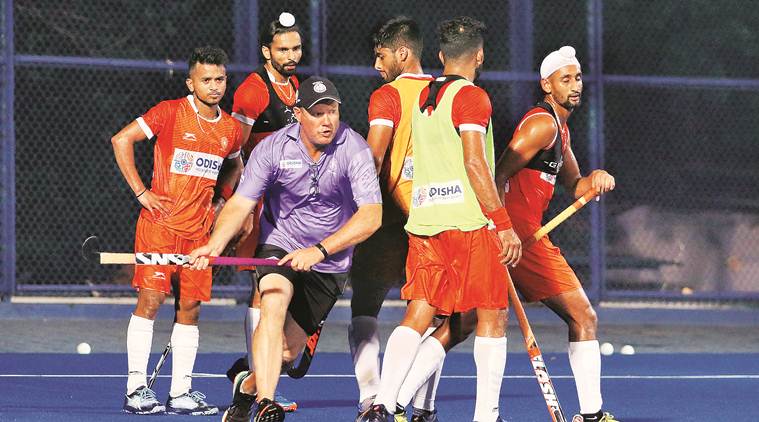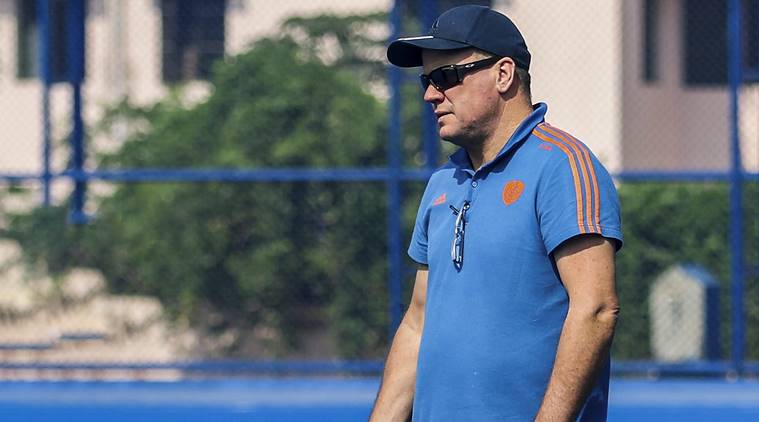
Australian Olympian Graham Reid has been handed the unenviable task of lifting the sagging spirits of the Indian men’s hockey team and turn them into contenders for the Tokyo Olympics. Before that, though, there is the tricky business of the qualifiers later this year. Reid, who coached Australia at the Rio Olympics and was the assistant coach of the Netherlands at the World Cup last year, took charge of the team in March. The team hasn’t played many matches this year. They finished runners-up at the Azlan Shah Cup in his first assignment and won the Hockey Series Finals, thus securing a place in the final round of Olympic qualifiers.
In an interview with The Indian Express, the 55-year-old talks about restoring belief among the players, creating leaders within the core group and the ‘gentleness’, which he says is a ‘disadvantage’ on the field.

How have your first few months been with the team?
I’ve been here since April so getting used to Bangalore (where the team is based). The tour to Australia (in May) gave us a good insight into the sort of level we need to play at to be the best team in the world. After we came back from there, we’ve focused on that, talked about being stronger in both circles – attacking and defensive. We had to improve that to compete at a higher level. Right now, the focus is a lot on fitness. It’s a good time to develop a good physical base so that we can keep the level up at training after we come from Japan (from the Olympic test event next month) and also going into next year. The other focus has been about the culture and getting the team to do some work behind the scenes to understand what their values are and how do we want to be seen as a team.
READ | Graham Reid: Mining, oil & gas… Indian hockey coach
How do the players want to be seen as a team?
Things like hard work, discipline and success came out from everybody. They realised we need to respect each other and the opposition. Belief is something that I really want to try and build in this team. Results help to build belief but you also need to take ownership of things. Trust, of course, is essential in any group. Everyone can train hard and be fit but this culture is important.
You mentioned belief, ownership, trust. Indian players often seem to be lacking in these traits. Is that an issue?
Any group of players will have these issues. That’s why it is so important to have connections among players so you can build trust and belief. It has to become a part of your DNA. Look, there is no silver bullet (that can solve this issue). Every coach will have their things that they like to work on but no one ever knows what the answer is.
Every Olympic cycle for India ends in disappointment. Do the players and those associated with hockey have the right mindset to reach a respectable international level?
Regarding the mindset of players, that is our job. We have to mould them into that. That’s why we started with culture stuff and getting them to understand what’s required from a mental point of view. We need to be mentally stronger. I think because Indian people are so nice, there is a gentleness to Indians that I love. But on a hockey field, that’s a disadvantage. It’s a matter of getting them to understand that you can do both – on the field, you can be sovereign and stronger, physically and mentally. Structure and everything else behind it, things are starting to move in a positive direction.
You mention players being nice and gentle. A few previous coaches have said there are groups within groups, that players play for themselves… As Australia and Netherlands coach, did you notice that in Indian teams? And do you worry about it now?
I’ve seen in all three teams that the sort of players that become good, elite athletes, there has to be a part of them that is selfish. My wife told me before the Seoul Olympics, when I was playing, ‘oh Graham, you’re so selfish.’ The most important thing is to get them to understand each other. Of course, I see differences between castes and areas. That’s in other teams too – in the Dutch team, Amsterdam boys will be different to boys from some other region – and they may not talk to each other. It’s not that they are not talking, it’s just that the connections are so good with people they’ve grown up with.
For example, some of the Punjab boys have very good connections and it is visible in the way they play. We have to build those connections with some other players. I always like to look at the positive side of people. I always treat them the way they treat me. While we understand it, we also need to work together. That’s why we put the team first.
You’ve worked in Australian and Dutch set-ups and now you’re in India. Can you compare the mentality of players from these three countries?
When you look at the Australians, it’s in our DNA that we are fighters. Our grandfathers and fathers fought in the First World War and Second World War. So there was a bit of a culture of standing up for yourself and your country. So we didn’t have to spend too much time on those things with the players as they come out naturally.
In the Netherlands, their culture is much more – I don’t want to say socialist – but they have real caring for everybody. So to get them to—India also shows that actually. Sometimes I watch training sessions and there’s this thing that, ‘oh, I don’t want to take a shot as my friend will be hit!’. These things are different to me and we just have to work through that.
What is your take on the ability of Indian players to read match situations?
You’ve got players that are good at it. There are others who sort of need to be told this is what you have to do. So I don’t think there’s one thing that I can say if Indians are better or worse. One of the things I have plans for is growing the leadership group. It’s one thing that will help. When the chips are down, when it becomes difficult, you’ll have more people who have leadership experience. I’m trying to understand if it’s an Indian culture thing that we don’t have more leaders in our group.
We want players who can take control… step up. I see times where players will do that and other times they’ll sit back and hide. What we try and do in training is point that out immediately and give an example. It has to become ingrained behaviour. It’s the transfer between training and game that you want to see.
India has not played any top nation in a competitive match this year. Is not having enough matches a problem?
It is what it is. I can’t do anything about that because things are set in concrete. They’ve budgets and everything else. We’re going to Europe later, before November (when the qualifiers will be held). That’s where we’ll get as much competition as possible. In Australia, we were always worried we aren’t getting enough competition so it came down to how you do in inter-squad games. Before the 2014 World Cup, in the inter-squad games, our (Australia’s) output was 40 per cent higher in terms of speed and GPS numbers than what the actual World Cup games were. Have all the competitions you like, but you can also recreate it in the training environment. That’s what we’re trying to do.
But in Australia, you had players who featured regularly at top European clubs. Do you think it is better for Indians to get high-level match experience instead of just being at national camps?
When I was coaching Australia, we preferred the Indian hockey league because it was only six weeks long. I think them playing in Holland was as much for their well-being and bank balance because they don’t get paid that well in Australia. So it was for that rather than just the competition, I guess. As I said, when you have a talented group of individuals – and I think we do have that here – you can build that competition where you need to.